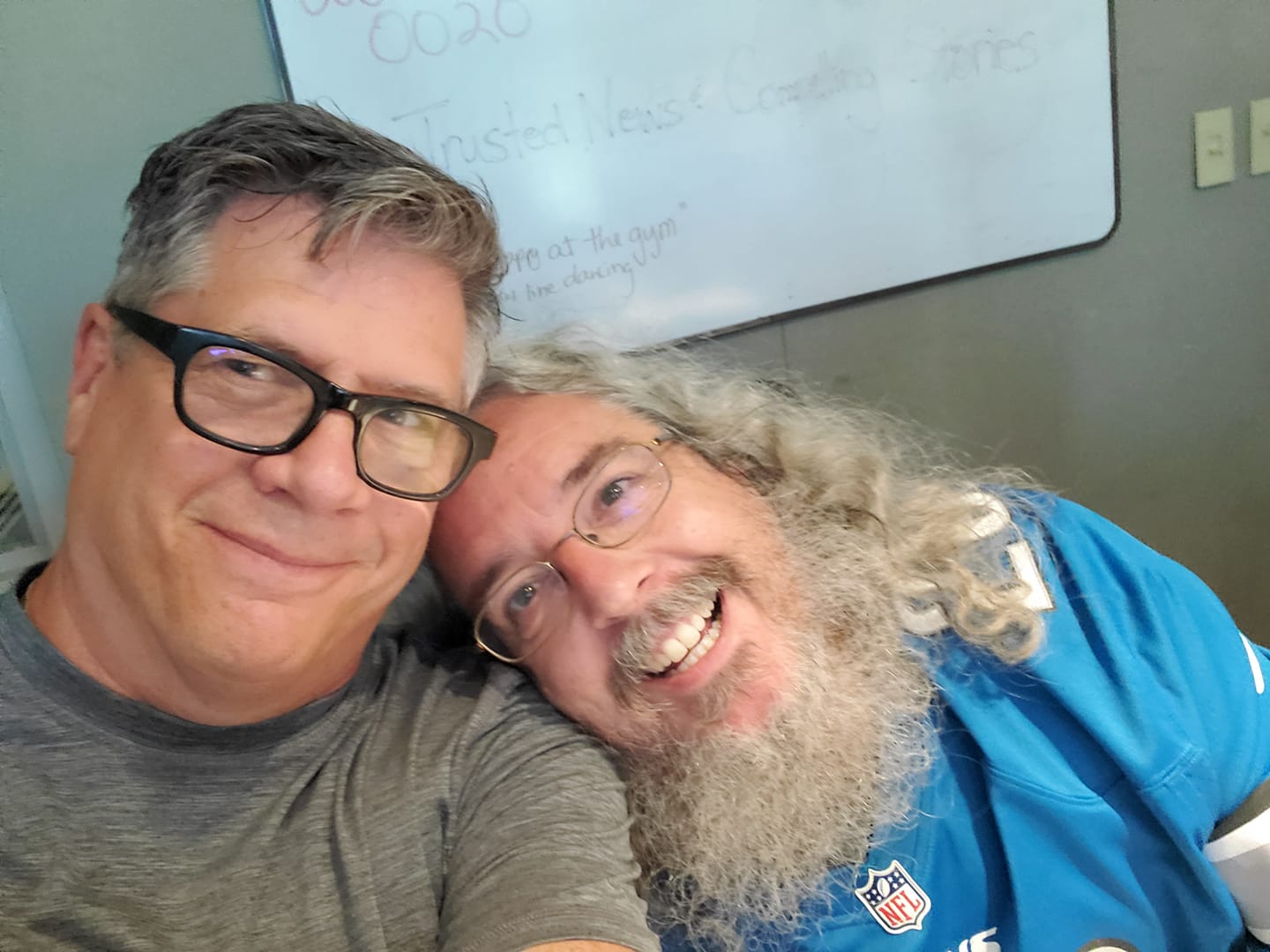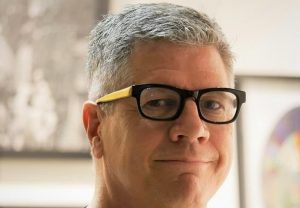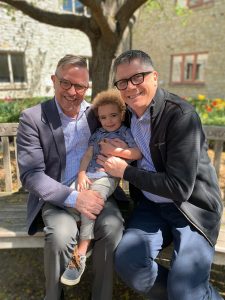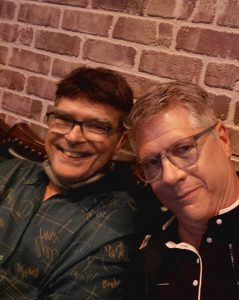
L-R Steven Stolen and Matthew Socey. Courtesy of Steven Stolen. Used with permission.
During my late thirties, I enjoyed some very special time with male friends, who would meet at my 46th Street bungalow on the edge of Indy’s SoBro for a salon of sorts that became known as “Couch Talk.” During these gatherings, at which snacks and beverages were consumed, we would all sit around my sectional sofa and discuss our work, current events, the arts, opine about politics or just gossip. They were always lively conclaves, made delightful by the camp humor spilling from my guests, all of them bright, witty and clever. Bonding us further together was the fact that AIDS was peaking at that time in Indy, adding another dimension to our close brotherhood.
At the time, I was the owner/operator of a film/video production company called The Alvarez Group and theatre reviewer for the former Arts Indiana. The core group of “Couch Talk,” all of whom I remain friends with today, included Tom Tyler, an arborist who now lives in the Chicago area, Richard Roberts, dramaturg at Indiana Repertory Theatre, David Hochoy, longtime artistic director at Dance Kaleidoscope, photographer Drew Endicott, David Murray, director of development at Columbia University in NYC, Rob MacPherson, V.P. of development & strategy at Central Indiana Community Foundation (CICF) and his now-husband Steven Stolen. The two of them have been together for 34 years, 13 of them legally. There daughter, Abbey Claire is nearly nearly 23-years old. Stolen is currently a nonprofit consultant.

Steven Stolen. Courtesy of Steven Stolen. Used with permission.
Stolen, whose company is called 52 Strategies, has had consulting and coaching engagements with IRT, Carmel Symphony Orchestra, Art with a Heart, Indianapolis Chamber Orchestra, Circle City Prep, Indiana Campus Compact, Kiwanis International, Indianapolis Opera, and the Julian Center. Stolen, whom I consider a true raconteur, is best known as the co-host of “Stolen Moments,” a weekly radio show on WFYI-FM of which I am an unabashed fan.
Whenever I see Stolen, I am reminded of those times when our group, each member still young in his career, was supportive and lent encouragement to one another. We also networked on behalf of each other and sometimes even collaborated as we all climbed the ladder to success. Recently, I met with Stolen for an interview, which ended up being in a quiet space in front of a bank building at 49th and Pennsylvania. Below is an edited transcript of our chat, in which we discussed his radio show, raising his and MacPherson’s 5-year old Cameron, the pandemic, and the local arts scene.
How was the pandemic?
Inconvenient. I feel fortunate that no one in my family was compromised. We had to do what everybody else did. One of the challenges was that we have this four year old in our lives and we have to modify things to accommodate him as well, but you know, there are many good things too. The pandemic sucked. When Cameron’s care came to the house, Rob and I had lunch and dinner together every night for over a year, it seemed, and we learned we don’t have to go to all kinds of events to have a lot. We found a richness and fullness together in our own world and we are comfortable in our own home.
Did you miss human connection?
Yes, I missed people. We are at this point in our lives and of a certain age where we think, “Gosh, I haven’t seen that person for six months, then 12 months, etc.” Very common things. Someone is your friend because you go to church with them. My friends who are octogenarians, am I ever going to see them again? There was a sadness in that and not going to the theatre and not hearing live music.
Were there other things you felt you had taken for granted?
We couldn’t just go out to dinner. The simple act of going to a favorite place, seeing the owner or the servers, seeing the tragedy of a Tinker Street close and try to reopen. Those people love me and love us. The casual pleasure we had. Not being able to go to church and see people there. They may not be close, but they are warm friendships.
Did you pick up any new hobbies?
I did a lot of self-awareness. Self-help stuff. And I dug into the habits of my life. I repositioned things. I walked a lot and at any given moment. I had the capacity to work as a freelancer, so if I wanted to go for a walk, I could. And there was something joyful about walking in our neighborhood and waving and saying hello to my neighbors on their porches. The pandemic gave me a special license to do that and there was a joy in that.
“Stop and smell the roses?”
It’s hokey, but it’s true. We tried to go to parks. We tried to get Cameron outside, which gets us outside.
Was it an anxious time?
Yes, I felt looming anxiety. Finding joy on a beautiful day, even if it’s cold. The fear was real because COVID could have killed any of us and it did kill some of us. Some that you and I know very well. And it could have been any of us. It could have been my kids. I didn’t feel I could afford to be fearful. I had people depending on me. I am not bulletproof, so I did what I needed to do.

L-R Rob MacPherson, Steven Stolen and grandson Cameron. Courtesy of Steven Stolen. Used with permission.
Did it occur to you what you would do if you did get it?
That worried me a great deal. Rob and I made a deal that we could not get sick because it would be very hard in our household to survive. “Survive” meaning to carry on the activity of the household. Having a small child. We asked ourselves, “How would we quarantine? How would we do it? How could we make him understand?” People who made it through and those who were sick, I don’t know how they made those kinds of adjustments. So, we did talk about it and we were worried about it, but you persevere and we were fortunate that we had each other. We all had each other.
How did the pandemic affect you professionally?
Well, as a singer. First of all, I was having some upper respiratory issues, which sort of shelved me for a while. In a way, as a singer, there was nowhere to sing, so I felt more sadness. I guess the word is “regret” for those who were relying on singing. Like actors, that’s their job. We both know the theatre community really well. This is what they do, so I felt more worried about “What are they going to do?”
Of course, you were aware that many artists found ways to perform and express themselves, right?
Yes, there were many who decided to sing outside or the many who said, “I am going to do this in my living room.” And that is part of the great entrepreneurial spirit of people who are artists. We talk about entrepreneurs who are part of the business world, especially the tech world and those who start their own business and who buy things and start selling them. Artists have to be entrepreneurial and the ones who decided they couldn’t not sing. They had to sing. So, what happens, to use that old adage, “I am going to sing as if no one is listening.” Because maybe everyone is listening. So that part of the artist is in me and the producer in me and the patron in me.
Let’s shift to “Stolen Moments?”
I have done a weekly radio show for 28 years.
I remember when it was called “Opera Matinee.”
It moved to the evening and Charles Staff, the critic at the Indianapolis News, said you must change the name to “Opera Soiree” and I said to Charles, “It sounds affected enough” (laughs). I have been around longer than Terry Gross. It got to the point that I was playing less and less opera and I wasn’t parodying opera, but I was telling people, “Don’t buy the album. Just buy the highlights” and “How about a little Rosemary Clooney now?” I did it from the beginning. My idea about radio is that people don’t listen to shows like “Opera Matinee.” I like to reveal things to people. I did the same as a teacher.
I have always though you are an excellent teacher.
When you are 25 and you’re a college professor, you think you are the smartest person in the room and you have to learn that actually, you are not. It takes a little while for most college professors to get that authenticity, which is not about what you have learned. It’s about what you really know that you can really impart. I like to think that as a teacher, I was listening to people and knowing them as human beings.
You were not the typical academic.
I always made fun of it. There is always a degree of bullshit to that. There is always “I am not as smart as I think I am, so you say to yourself, “I am going to stay being smart about these things and I am kind of bulletproof there and not vulnerable.” You are kind of dismissive about things you don’t know. I was always kind of a curious guy. Just being interested in what I was teaching was what a kid was interested in. So, I am teaching and a kid wants to strap on a guitar in a senior recital and play a Bill Joel song. For a while it was like, “You can’t possibly do that.” And later, “Why the hell not?”
How much does curiosity inform your work?
I think when you are interested in other people, that edifies you. Being curious about the world, it fuels us. I was not bored during the pandemic. There were times where it was tiresome, but there is always stuff to think about and people to know and so I hope that comes through in the show.
What sort of feedback do you get from your listeners?
I have some people who are really loyal and check in. Pretty frequently, someone will ask, “What was that? What was that song with the harmonica?” Here is the challenge for me, Tom. In my mind, I am moving on from the show pretty quickly because you are thinking about the next one. When you are doing a weekly program, there is a lot rattling around out there, so sometimes, honestly, I don’t remember. I was on Gerry Dick’s show once and before we went on Inside Indiana Business, I said, “What’s on the show this week?” He said, “I don’t remember.” Because you are moving on to the next thing and I think that is the way you keep yourself lively too. You are not living in the past.
What is Matthew Socey’s involvement?
Well, he is the producer and on the board. Back in the old days, I produced everything myself. That was when the studio was at 14th and Meridian. I recorded on a reel to reel and I was still using LPs. That’s when they were still viable. They weren’t just hip. And cassettes.
(At this point during the interview Jan Virgin, who just retired as managing director of Dance Kaleidoscope, recognized us. So, we took time to greet her.)
Back to Matthew.
I used to have a producer and I got very nervous and I tried a script, but I wasn’t very good. Then the show changed and became more eclectic. The station has been great. They always let me play whatever I want. I had someone with me in the studio to kind of run the board. You don’t have to do that anymore. And Matthew came in to run the board and then it became talk radio. We talked like morning AM or FM radio, where you sort of engage with people. So, what’s evolved is that Matthew is the producer/engineer. I am the host and he is kind of…this sounds denigrating…he’s the sidekick. But his head is so full of stuff. He’s brilliant and never without something to say.
I enjoy the spontaneity between the two of you.
He never knows the playlist. We usually record on a Friday morning for a Sunday show.

L-R Gary Walters. Courtesy of Steven Stolen. Used with permission.
I imagine trust counts for a lot when you are working with someone like Socey?
Gary Walters has been my pianist for many, many years. Gary will get me through anything. Catherine Bringerud can also get me through anything.
How much longer will you do the show?
I thought when I was doing the old show, I would be done. I thought many times, “We are done.” I don’t feel that way about this show. I feel like…I am not dry of ideas. This is Tuesday and I have many paths I could go down for the show this week. I have not predetermined the show.
Switching topics. You and I have always shared a similar passion for the arts. How do you view the local landscape?
Do I think that it is appreciated enough? Probably not. It is so different now than it was 10 years ago or 20 years ago. I think the way it is different is small ball really matters. If you couldn’t get hundreds of people to something, it wasn’t viable. There have been things. One of the things I think has been influential was the emergence of IndyFringe. When Pauline (Moffat) launched IndyFringe, it was this quirky and weird thing. At the time, I was a theatre producer for many years (managing director at IRT). IndyFringe was people in their underwear doing plays and they were short and not very expensive, so why not go? Really, it was OK for 25 people, or 50 or 100 people. That’s a really good crowd. And I think we’ve learned that’s viable. That’s not some sort of second-rate art. And in many ways, people don’t want to go to big concert halls. They want to get closer. They actually like the idea of running into someone at the gas station or by the lettuce at the grocery store or in the coffee shop whom they saw singing on stage. You go someplace for breakfast and someone says, “I really like your show.” It’s nice to hear people say that, but I don’t think we have always had that sensibility. We have always had the big guys. The big players and that was the measuring stick. Could you perform with the symphony?
Has art become more democratic?
It’s not because it’s populist. Art is populist. There is actually something everybody likes. A lot of people think art is still, in a frame, in a quiet room somewhere, and some think there is still that old-fashioned notion about that and it’s perfectly fine. That is what we call “traditional” and it’s not very diverse. It’s not very accessible and it’s kind of expensive. And that is not ruling the day anymore. One of the things we have learned during COVID is that if you think going back to charging a lot of money to go sit in the dark somewhere and that people are going to choose that all the time, I think you are wrong. It’s a different kind of community. It’s a vibrant community. It’s more local; I mean people in your neighborhood, not just isolated in this spot or that spot.

Steven Stolen. Courtesy of Steven Stolen. Used with permission.
I have always felt that you and I share so much in common in terms of how we have often reinvented ourselves. You have been a singer, teacher, arts administrator and even ran Indy Humane. Have you ever been judged by those who think moving around too often shows instability?
I’ll use that word “curious” again, but I think it’s fair to say I am a little restless. I do not think that’s a bad thing. I know who I am and I lean into that. I lean into the fact that I have done a lot of things and some of them have been really short term. Because when you’ve made your connection to this or you made your contribution as someone who can come in and change it, fix it, and help it…It’s why consulting is challenging because you have to keep the bucket full at the same time, but when you are done, you’re done. One job was going to be 36 months. We finished in 20 and we agreed that I needed to go. I was at the IRT, blissfully, for many years and had wonderful colleagues and the most family people in my life. But it was time for me to go, because if I had stayed, it was going to have to be another 10 years and frankly, my friend Suzanne (Sweeney) needed a chance to run that company too.
I lean into the fact that I have been fired. All that stuff has made me a better individual. It’s made me a better person because those very experiences have required me to work with all kinds of different people, in different sectors. I worked in in animal welfare. I worked in social services. I worked in economic development. I worked as teacher. I was in education. I worked in elementary education. I tried to build a school. And then that would all come back to me as an artist and teacher. It all helped to form my life in many ways and I think just because we move around doesn’t mean we are some kind of gadfly. It means every time I moved, there was another opportunity for me to consider and some of them worked out really well, some of them less well. I own that. But I welcomed the question. Like you welcomed the question, “What did I get from that?” A lot. Saving dogs and cats. It’s hard. So, you know, I think there is value in all those experiences and what we know now is that is the way young people are wired, so maybe you and I are just younger than springtime. We are certainly gayer than laughter.
“Stolen Moments” airs on WFYI-FM 90.1 Sundays at 6 p.m. and Thursdays at 8 p.m. For more information visit wfyi.org.





